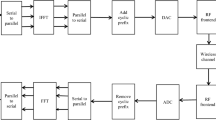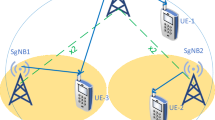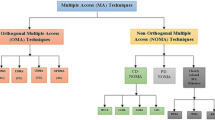Abstract
Orthogonal variable spreading factor (OVSF) codes are used for CDMA based networks to handle multimedia rates. While waiting time (or call establishment delay) is a significant QoS parameter for real time calls, its impact on non-real time calls is negligible. Traditionally, the call handling in OVSF based CDMA system has been accomplished with multi code approach, where the arriving call is divided into many quantized fractions and each fraction is handled by different code. These designs are very efficient for non-real time calls, but the code search corresponding to each fraction needs significant time that makes existing multi code approaches unsuitable for real time calls. This paper describes a novel multi code design, in which the waiting time for real time call is zero. The design initially assigns the incoming call to the vacant code with the capacity equal to call capacity, and subsequently looks for the vacant codes for each quantized fraction after code assignment. Once the vacant codes with capacities equal to the capacity of all rate fractions are available, the call is shifted to these codes. The information of this code assignment for every fraction needs to be sent to the receiver like existing schemes. Therefore, there is no additional hardware requirement for the proposed design. Simulation results show significant dominance of our scheme as compared to the existing multi code schemes.



Similar content being viewed by others
References
Chao, C. M., Tseng, Y. C., & Wang, L. C. (2005). Reducing internal and external fragmentation of OVSF codes in WCDMA systems with multiple codes. IEEE Transactions on Wireless Communications, 4, 1516–1526.
Adachi, F., Sawahashi, M., & Okawa, K. (1997). Tree structured generation of orthogonal spreading codes with different lengths for forward link of DS-CDMA mobile radio. IEE Electronics Letters, 33, 27–28.
Tseng, Y. C., & Chao, C. M. (2002). Code placement and replacement strategies for wideband CDMA OVSF code tree management. IEEE Transactions on Mobile Computing, 1(4), 293–302.
Askari, M., Saadat, R., & Nakhkash, M. (2008). Comparison of various code assignment schemes in wideband CDMA. In Proceedings of IEEE on computer and communication engineering, (pp. 956–959). Kuala Lumpur.
Park, J. S., & Lee, D. C. (2003). Enhanced fixed and dynamic code assignment policies for OVSF-CDMA systems. In Proceedings of the IEEE ICWN (pp. 620–625).
Saini, D. S., & Balyan, V. (2014). Top down code search to locate an optimum code and reduction in code blocking for CDMA networks. Springer Journal of Wireless Personal Communication, 75, 465–482.
Balyan, V., & Saini, D. S. (2013). Vacant codes grouping and fast OVSF code assignment scheme for WCDMA networks. Springer International Journal of Telecommunication Systems, 52(4), 1719–1729.
Saini, D. S., Gupta, A., & Joshi, A. (2011). Reducing code wastage in orthogonal variable spreading factor-based wideband code division multiple access networks. Wiley Journal of Communication Systems,. doi:10.1002/dac.1374.
Minn, T., & Siu, K. Y. (1998). Dynamic Assignment of orthogonal variable spreading factor codes in W-CDMA. IEEE Journal on Selected Areas in Communications, 18(8), 1429–1440.
Park, J. S., Huang, L., & Jay, K. C. C. (2008). Computationally efficient dynamic code assignment schemes with call admission control (DCA-CAC) for OVSF-CDMA systems. IEEE Transactions on Vehicular Technology, 57(1), 286–296.
Yang, Y., & Yum, T. S. P. (2005). Multicode multirate compact assignment of OVSF codes for Qos differentiated terminals. IEEE Transactions on Vehicular Technology, 54(6), 2114–2124.
Chen, M. X. (2008). Efficient integration OVSF code management architecture in UMTS. Computer Communications, 31(9), 3103–3112.
Saini, D. S., & Bhooshan, S. V. (2009). OVSF code sharing and reducing the code wastage capacity in WCDMA. Wireless Personal Communications, 48, 521–529.
Saini, D. S., & Sharma, N. (2013). Reduction in code blocking using scattered vacant codes for OVSF based WCDMA networks. IET Communication, 1(7), 40–48.
Saini, D. S., & Upadhyay, M. (2009). Multiple rake combiners and performance improvement in WCDMA systems. IEEE Transactions on Vehicular Technology, 58(7), 3361–3370.
Tsai, Y. R., & Lin, L. C. (2009). Quality-based OVSF code assignment and reassignment strategies for WCDMA systems. IEEE Transactions on Vehicular Technology, 58(2), 1027–1031.
Author information
Authors and Affiliations
Corresponding author
Rights and permissions
About this article
Cite this article
Saini, D.S., Balyan, V. An Efficient Multicode Design for Real Time QoS Support in OVSF Based CDMA Networks. Wireless Pers Commun 90, 1799–1810 (2016). https://doi.org/10.1007/s11277-016-3424-4
Published:
Issue Date:
DOI: https://doi.org/10.1007/s11277-016-3424-4




